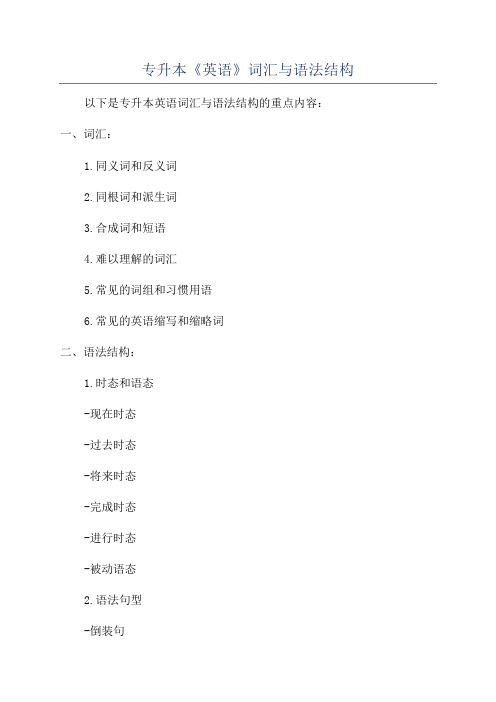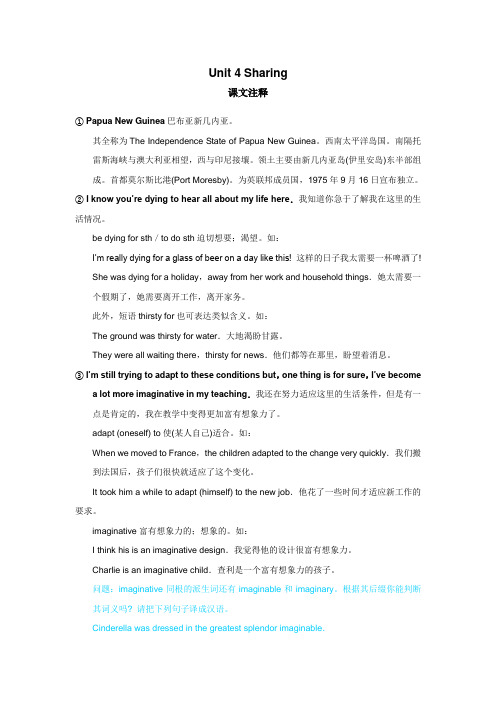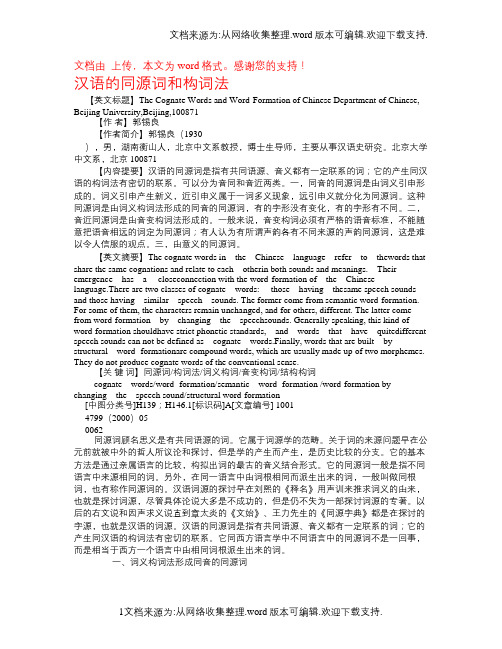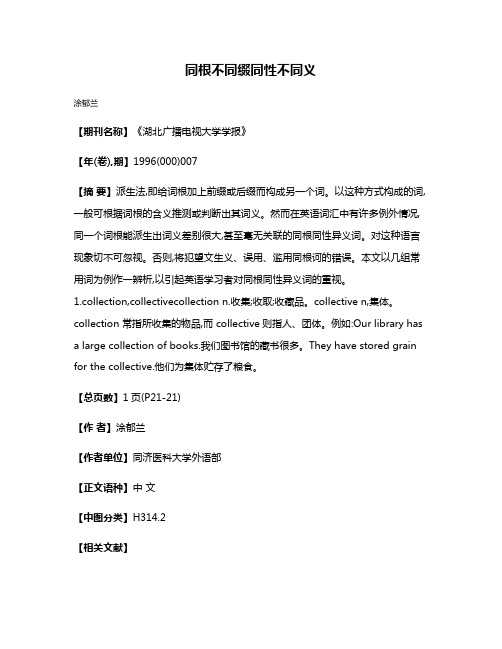同根派生篇
专升本《英语》词汇与语法结构

专升本《英语》词汇与语法结构以下是专升本英语词汇与语法结构的重点内容:
一、词汇:
1.同义词和反义词
2.同根词和派生词
3.合成词和短语
4.难以理解的词汇
5.常见的词组和习惯用语
6.常见的英语缩写和缩略词
二、语法结构:
1.时态和语态
-现在时态
-过去时态
-将来时态
-完成时态
-进行时态
-被动语态
2.语法句型
-倒装句
-条件句
-间接引语和直接引语
-强调句
3.从句和复合句
-名词性从句(主语从句、宾语从句、表语从句、同位语从句)-定语从句
-状语从句
-表语从句
4.代词和词性
-人称代词和物主代词
-反身代词和相互代词
-指示代词和疑问代词
-不定代词和关系代词
5.形容词和副词
-基本形容词和副词的比较级和最高级
-修饰方式、程度、时间和频率的副词
-形容词和副词的转化
6.名词和数词
-可数名词和不可数名词
-单数名词和复数名词
-名词的所有格
-基数词和序数词
以上是专升本英语词汇与语法结构的主要内容,希望对你的学习有帮助。
课文注释 Unit 4 Sharing

Unit 4 Sharing课文注释①Papua New Guinea巴布亚新几内亚。
其全称为The Independence State of Papua New Guinea。
西南太平洋岛国。
南隔托雷斯海峡与澳大利亚相望,西与印尼接壤。
领土主要由新几内亚岛(伊里安岛)东半部组成。
首都莫尔斯比港(Port Moresby)。
为英联邦成员国,1975年9月16日宣布独立。
②I know you’re dying to hear all about my life here.我知道你急于了解我在这里的生活情况。
be dying for sth/to do sth迫切想要;渴望。
如:I’m really dying for a glass of beer on a day like this! 这样的日子我太需要一杯啤酒了!She was dying for a holiday,away from her work and household things.她太需要一个假期了,她需要离开工作,离开家务。
此外,短语thirsty for也可表达类似含义。
如:The ground was thirsty for water.大地渴盼甘露。
They were all waiting there,thirsty for news.他们都等在那里,盼望着消息。
③I’m still trying to adapt to these conditions but,one thing is for sure,I’ve becomea lot more imaginative in my teaching.我还在努力适应这里的生活条件,但是有一点是肯定的,我在教学中变得更加富有想象力了。
adapt (oneself) to使(某人自己)适合。
如:When we moved to France,the children adapted to the change very quickly.我们搬到法国后,孩子们很快就适应了这个变化。
汉语的同源词和构词法权威资料语言文字学基础

文档由上传,本文为word格式。
感谢您的支持!汉语的同源词和构词法【英文标题】The Cognate Words and Word-Formation of Chinese Department of Chinese, Beijing University,Beijing,100871【作者】郭锡良【作者简介】郭锡良(1930),男,湖南衡山人,北京中文系教授,博士生导师,主要从事汉语史研究。
北京大学中文系,北京100871【内容提要】汉语的同源词是指有共同语源、音义都有一定联系的词;它的产生同汉语的构词法有密切的联系。
可以分为音同和音近两类。
一,同音的同源词是由词义引申形成的。
词义引申产生新义,近引申义属于一词多义现象,远引申义就分化为同源词。
这种同源词是由词义构词法形成的同音的同源词,有的字形没有变化,有的字形有不同。
二,音近同源词是由音变构词法形成的。
一般来说,音变构词必须有严格的语音标准,不能随意把语音相远的词定为同源词;有人认为有所谓声韵各有不同来源的声韵同源词,这是难以令人信服的观点。
三,由意义的同源词。
【英文摘要】The cognate words in the Chinese language refer to thewords that share the same cognations and relate to each otherin both sounds and meanings.Their emergence has a closeconnection with the word-formation of the Chinese language.There are two classes of cognate words: those having thesame speech sounds and those having similar speech sounds. The former come from semantic word-formation. For some of them, the characters remain unchanged, and for others, different. The latter come from word-formation by changing the speechsounds. Generally speaking, this kind of word-formation shouldhave strict phonetic standards,and words that have quitedifferent speech sounds can not be defined as cognate words.Finally, words that are built by structural word- formationare compound words, which are usually made up of two morphemes. They do not produce cognate words of the conventional sense.【关键词】同源词/构词法/词义构词/音变构词/结构构词cognate words/word- formation/semantic word- formation /word-formation by changing the speech sound/structural word-formation[中图分类号]H139;H146.1[标识码]A[文章编号] 10014799(2000)050062同源词顾名思义是有共同语源的词。
同根形容词

同根形容词同根形容词就是由同样的词根派生而意义不同的形容词。
比如说一个consider可以派生出considerable(值得考虑的)和considerate (体贴的)两个形容词,这种同根形容词很多,大家先看下边的单词:你发现什么规律了吗?interest——interested——interesting relax——relaxed——relaxing, embarrass——embarrassed——embarrassing bore——bored——boringtire——tired——tiringrelax——relaxed——relaxingamaze——amazed——amazing surprise——surprised——surprising他们都属于同根单词,由同一个动词在后边加—ing和—ed构成形容词。
那怎么正确使用呢?很多同学对这两个形容词怎么正确使用不大感冒,其实区分它们非常的简单,大家看一下。
像interesting,它后边有个ing形式,和thing 的尾巴是一样的,thing是东西的意思,所以以ing结尾的是修饰物的。
而interested,这是过去分词充当的形容词,他是用来修饰人的。
其他所有的都是一样的原理。
请看例句:1.We are interested in the English story because it's very interesting.我们对这个英语故事感兴趣,因为它很有趣。
2.The boy is very excited to see the exciting moment.这个男孩看到这激动人心的时刻,很兴奋。
3.He's very embarrassed because the work is very embarrassing.他很尴尬/窘迫/害羞,因为他的工作令人尴尬。
4.The workers got bored with the boring work in the factory.那个年代的工人们对流水线上的烦人工作感到厌倦。
同根不同缀 同性不同义

同根不同缀同性不同义
涂郁兰
【期刊名称】《湖北广播电视大学学报》
【年(卷),期】1996(000)007
【摘要】派生法,即给词根加上前缀或后缀而构成另一个词。
以这种方式构成的词,一般可根据词根的含义推测或判断出其词义。
然而在英语词汇中有许多例外情况,同一个词根能派生出词义差别很大,甚至毫无关联的同根同性异义词。
对这种语言现象切不可忽视。
否则,将犯望文生义、误用、滥用同根诃的错误。
本文以几组常用词为例作一辨析,以引起英语学习者对同根同性异义词的重视。
1.collection,collectivecollection n.收集;收取;收藏品。
collective n,集体。
collection 常指所收集的物品,而 collective则指人、团体。
例如:Our library has a large collection of books.我们图书馆的藏书很多。
They have stored grain for the collective.他们为集体贮存了粮食。
【总页数】1页(P21-21)
【作者】涂郁兰
【作者单位】同济医科大学外语部
【正文语种】中文
【中图分类】H314.2
【相关文献】
1.论《尔雅》同义词内部地位的不等同性 [J], 王建莉
2.同义词不同义--英语同义词之间的差异 [J], 梁松鹤
3.不同根根管预备方法和不同根管充填技术组合对根尖微渗漏的影响 [J], 杨涛
4.同义词不同义 [J], 陈国崇
5.英语同根派生词和同义词的教学 [J], 吴瑞芳
因版权原因,仅展示原文概要,查看原文内容请购买。
外国文学史名词解释

1、历史语言学2、共时语言学3、普通语言学4、语言5、言语6、组合关系7、聚合关系8、语言的层级性9、语言的渐变性10、语言的参差性11、语言的分化12、语言的混合13、语言的融合: 14、频率15、乐音16、音素17、音位18、音位变体19、音位的区别20、语义21、义素。
22、语义场23、预设24、蕴含25、语汇26、词27、语素28、词根。
29、词辍30、构词法31、基本词汇32、语法33、词形范畴34、语法范畴35、词类范畴36、语法手段37、显性意义38、隐性意义39、显性形式40、隐性形式41、文字42、表意文字43、表音文字44、自源文字45语言学46语文学47历史语言学48 历史比较语言学49描写语言学50历时语言学51个别语言学52普通语言学53语言的语言学54言语的语言学55内部语言学(微观语言学)56外部语言学57对比语言学58微观语言学(内部语言学)59宏观语言学(外部语言学)60理论语言学61应用语言学62结构主义语言学63形式语言学64交叉语言学65语言实66言语67思维68符号69组合关系70聚合关系71语言的线条性72语言的任意性73语言的层级性语74言语规律75渐变性规律76参差性规律77语言的分化78语言的整化79语言的融合80语言的混合。
81语音82 语音学研83 音高84音强85 音长86音质87频率88 振幅89乐音90噪音91共振峰92音素93 国际音标94音位95音位变体96非音质音位97音位区别特征98音位体系99音节100语流音变101句位学102语音规律语103语义104语言意义105 言语意义106 义素107义项108 语义场109 语境110词汇意义111 概念意义112语法意义113话题一114 述题115谓词116述项117预设118 蕴含119语义指向120词汇121语言词汇122言语词汇123词是124固定词组也125语素126词根127 词缀128 词尾129单纯词130 合成词131 复合词132派生词133联绵词指134叠音词135重叠词136 同音词137 同形词138 同源词139同根词。
派生词英语词典

派生词英语词典
《派生词是指通过在一个词的基础上添加前缀、后缀或者进行词形变化等方式形成的新词。
以下是一些常见的派生词及其解释:
1. 前缀派生词:
Unhappy(不快乐):un-(否定前缀)+ happy(快乐)
Misunderstand(误解):mis-(错误前缀)+ unde rstand(理解)
Preheat(预热):pre-(前缀)+ heat(加热)
2. 后缀派生词:
Teacher(老师):teach(教)+ -er(职业后缀)
Beautiful(美丽的):beauty(美)+ -ful(形容词后缀)
Happily(快乐地):happy(快乐)+ -ly(副词后缀)
3. 同根词派生:
Nation(国家):national(国家的),nationality(国籍)
Child(孩子):childish(孩子气的),childhood(童年)
4. 合成词派生:
Breakfast(早餐):break(打破)+ fast(快速)
Raincoat(雨衣):rain(雨)+ coat(外套)
请注意,这仅是派生词的一些例子,实际上英语中有很多不同的派生方式和规则。
如果需要更详细的派生词解释,可以查询英语词典或在线词典,如Merriam-Webster或Oxford Engl ish Dictionary。
训诂学简答

1.传”“笺”“正义”“疏”“音义之学”各是什么?①“传”是对经书的解释。
②正义即解释经文,又对前人的注释加以解释,与“疏”相同。
③笺是郑玄对《诗经》的解释。
④音义即解释注解又解释义音。
2.传注附加在相应的经文之下的格式,自汉以后,主要有以下几步大的逐步完善的过程:(1)把注和经合为一书,但经仍然是经,注仍然是注,只是把注疏附在经的后面;(2)把注分别附在与经文相应的各篇或各章之后;(3)把注与相应的经文语句相符,置于相应的经文之后;(4)把注文附在句中相应的字词下面;(5)义疏与经注合印,开始于南宋。
3.传注体训诂的类型:(1)从传注的对象来说,可以分为注(对原文的注解)和疏(既注解原文又注解注)。
(2)从传注的作者来分,可分为自注和他注。
(3)从训诂的内容来说,可分为释义类传注和叙事类传注。
(4)从注解之间的关系说,可分为原注、补注、集注。
4.词汇和词义古今演变的几种情况(一)语汇的消长(二)词的结构古今不同(三)词义演变之后,古今意义不同、5.词义的社会性是指:不是任何人主观决定的,而是由社会公众约定俗成并受社会制约的,这是词义的社会性。
如《左传庄公十年》肉食者谋之,又何间焉的间解释为参与,是符合词义的社会性原则的。
又如把相望解释成彼此相望相距很近,可以望见,递相望见都不符合词义社会性的训诂原则。
①同音。
例如,“景,竟也,所照处有竟限也。
”“晷,规也,如规画也。
”“土,吐也,吐生万物也。
”“盲,茫也,茫茫无所见也。
”②双声。
例如,“星,散也,列位布散也。
”“火,化也,消化物也。
”“木,冒也,华叶自覆冒也。
”③叠韵。
例如,“山中丛木曰林。
林,森也,森森然也。
”“矢,指也,言其有所指向迅疾也。
”“毂,□也,体坚□也。
”④音转相近。
例如,“船,循也,循水而行也。
”“癣,徙也,浸淫移徙处日广也。
故青徐谓癣为徙也。
”“鼓,郭也,张皮以冒之,其中空也。
”“辔,拂也,牵引拂戾以制马也。
”这4种声音关系主要从形状、性质、现象、功用和人所感受等各方面加以推陈,以说明事物命名之所以然,其中也自有可取之处;然而每个名号各自为说,且又多出于主观推测,不尽可信。
- 1、下载文档前请自行甄别文档内容的完整性,平台不提供额外的编辑、内容补充、找答案等附加服务。
- 2、"仅部分预览"的文档,不可在线预览部分如存在完整性等问题,可反馈申请退款(可完整预览的文档不适用该条件!)。
- 3、如文档侵犯您的权益,请联系客服反馈,我们会尽快为您处理(人工客服工作时间:9:00-18:30)。
同根派生篇
1.Absent/absence/absentee/ absent from/ present at
2.Accord/accordance/accordingly/ in accordance with
3.account/accountant/accountancy/accounting/ count
4.action/act/activity/actor/activist/ reaction/reactor
5.additions/additives
6.alive/living/lively/live
7.application/applicant/appliance/applicable/applied;
8.applause/applaud
9.ashamed/shameful/shameless
10.asleep/sleepy/sleeping/overslept
11.associates/association
12.attendance/attendant/attention/attentive
13.base/basement/basis/basic
14.beneficial/beneficent/beneficiary
15.captive/capture;
16.chemistry/chemicals/chemist
17.childlike/childish
18.discomfort/uncomfortable
parable/comparative/incomparable;
prehensive/comprehensible/comprehending/comprehension;
21.considerate/considerable/considering/considered;
22.continual/continuous/continuum/continuance/continuation/continuing;
23.delightful/delighted
24.dependent/dependant
25.desirous/desirable/desired
26.destructible/indestructible/destructive/constructive
27.different/indifferent
28.discourage/encourage/courage/courageous
29.economic/economical
cational/educative
35. electric/electrical/electrician/electronics/electricity
36.emergence/emergency;
37. employment/employer/employee/employed/unemployed
38.emigrate/immigrate/migrate/migrant;
39.explosive/explosion/exploding/explosiveness
40.exhaustive/exhausted/exhausting/exhaustion
41.express (v) express (adj.)/expressive
42.farther/further
43.formal/former/format/formation/formative
44.graceful/gracious
45.misfortune/unfortunate
46.handful/handy;
47.hard/hardly/hardship
48.harmful/harmless
49.healthful/healthy
50.helpful/helpless
51.high/highly
52.historic/historical;
53.hopeful/hopeless
54.honorary/honorable;
55.humane/human
56.imaginable/imaginary/imaginative;
57.indignity/indignation/indignant;
58.indoor/indoors/outdoor/outdoors
59.industrial/industrious;
60.installment/installation;
61.institute/institution
62.instructional/instructive
63.intelligent/intelligible
64.intense/intensive
65.just/justice/justify/justly
66.disinterested/uninterested
te/later/latest/lately/latter
ugh/laughter
wless/unlawful/legal/illegal
70.learned/learnt/learning
71.light/lighting
72.like/unlike/alike/dislike
73.likely/likeable
74.lie/lay/lying/lied
75.limit/limitation/limited
76.little/less/lessen/least
77.load/unload/download/reload/overload/underload
78.love/lovely/lovable/beloved
79.mechanic/mechanical/mechanics
80.mean/means/meaning/meaningful/meanness
81.note/notice/notify/notable/notification;
82.numerical/numerous/numbered/numeral/number;
83.official/officer/officious
84.personnel/personal/personify/personification;
85.physician/physicist/physics/physical;
86.pollution/polluter/pollutant/polluted/
87.popular/populous/population/populated/overpopulated/underpopulated
88.present/presence/presentation
89.proposition/proposal/proposed
90.principle/principal
91.produce/production/product
92.publication/publicity/public;
93.receiver/receipt/reception/receptionist
94.regrettable/regretful
95.respective/respectful/respectable/respected
96.responsible/responsive;
97.route/routine;
98.sensible/sensitive;
99.sign/signal/signature/signify/signification/significant/significance 100.skillful/skilled/unskilled/unskillful
101.spacious/spatial/spaced/spacing ;
102.species/specimen;
103.specific/special/specialty;
104.spectacles/spectacular/speculate/spectator;
105.successive/successful/succeeding/succeeded/unsuccessful; 106.technique/technology/technological/technical;
107.typewriter/typist/typing/typed;
108.uncover/discover/recover/undercover;
109.variable/variation/variety/variance/variant;
110.varied/various/variable/variant
111.vegetation/vegetable。
